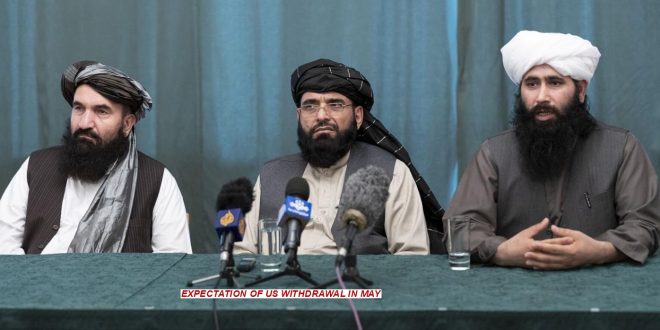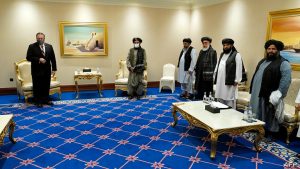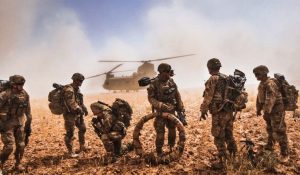20-03-2021
By SJA Jafri + Bureau Report + Agencies
MOSCOW/ WASHINGTON/ KABUL/ ISLAMABAD: The Taliban warned the United States on Friday against defying a May 1 deadline for the withdrawal of 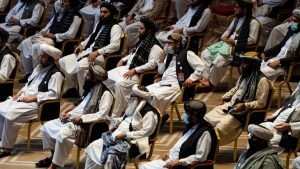 US and NATO troops from Afghanistan, promising a “reaction” though failing to specify exactly what it would be.
US and NATO troops from Afghanistan, promising a “reaction” though failing to specify exactly what it would be.
The Taliban issued their warning at a press conference in Moscow, the day after meeting with senior Afghan government negotiators and international observers to try to jump-start a stalled peace process to end Afghanistan’s decades of war.
US President Joe Biden’s administration says it is reviewing an agreement that the Taliban signed with the administration for former President Donald Trump. Biden told in an interview on Wednesday that the May 1 deadline “could happen, but it is tough”, adding that if the deadline is extended it will be by “a lot longer”.
“They should go,” Suhail Shaheen, a member of the Taliban negotiation team,  told reporters, warning that staying beyond May 1 would breach the deal.
told reporters, warning that staying beyond May 1 would breach the deal.
“After that, it will be a kind of violation of the agreement. That violation would not be from our side … Their violation will have a reaction.”
He did not elaborate on what form the “reaction” would take, but in keeping with the agreement they signed in February 2020, the Taliban have not attacked US or NATO forces, even as unclaimed bombings and targeted killings of Afghan security forces and civilians have spiked in recent months.
“We hope that this will not happen, that they withdraw and we focus on the settlement, peaceful settlement of the Afghan issue, in order to bring about a permanent and comprehensive ceasefire at the end of reaching a political roadmap (for) Afghanistan,” Shaheen said.
The Taliban also pushed back against major regional players who said Afghanistan should not return to being an Islamic state.
On Thursday, the United States, Russia, China and Pakistan in a joint statement said they “did not support the restoration of the Islamic Emirate” but Taliban political spokesman Mohammad Naeem, speaking to media in Moscow on Friday, said it was up to Afghans to decide their system of governance and it should be an Islamic system.
“What is stated in the declaration is against all principles and is not acceptable,” he said.
Shaheen also said the Taliban was firm on their demand for an Islamic government. He did not elaborate on what an Islamic government would look 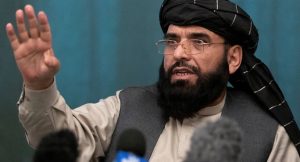 like, or whether it would mean a return to their repressive rules that denied girls education, barred women from working, and imposed harsh punishments.
like, or whether it would mean a return to their repressive rules that denied girls education, barred women from working, and imposed harsh punishments.
Shaheen did not say whether the Taliban would accept elections, but he emphasized the government of President Ashraf Ghani would not fit their definition of an Islamic government.
In previous statements, the Taliban has said its vision of an Islamic government would allow girls to attend school, and women to work or be in public life but in every conversation, they emphasized the need to follow Islamic injunctions without specifying what that would mean.
The Taliban has said it would not accept a woman as president, and while women could be judges they could not take the job of chief justice but even without the Taliban in government in Afghanistan, the Georgetown Institute 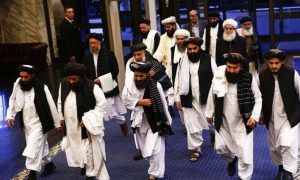 for Women, Peace and Security Afghanistan said Afghanistan was one of the worst places in the world to be a woman in 2020.
for Women, Peace and Security Afghanistan said Afghanistan was one of the worst places in the world to be a woman in 2020.
Only one woman attended Thursday’s talks in Moscow, and in the two decades since the Taliban were ousted, successive governments in Kabul have been unable to ratify a law outlawing violence against women.
Meanwhile, the Taliban refused to promise they would not launch a spring offensive despite calls from the US, Russia and China.
“I started ‘jihad’ (holy war) to remove foreign forces from my country and establish an Islamic government, and jihad will continue until we reach that goal through a political agreement,” said Khairullah Khairkhwa, a member of the negotiating team, who was one of five Taliban freed from the US prison on 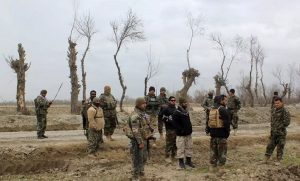 Guantanamo Bay in 2013 in exchange for the release of a captured US soldier.
Guantanamo Bay in 2013 in exchange for the release of a captured US soldier.
Security situation
Meanwhile, President Ghani dismissed two leading ministers charged with the country’s faltering security in a surprise announcement on Friday.
In a statement, the president’s national Security Council announced army chief of staff General Mohammad Yasin Zia would double as defence minister, replacing Asadullah Khalid, who is believed to be suffering from serious health issues.
Former Kandahar and Nangarhar governor Hayatullah Hayat, meanwhile, will take over the interior ministry from Masoud Andarabi, with the palace citing the need to improve “the security situation” in the country.
Major urban centers and rural areas in Afghanistan are in the grip of a worsening armed campaign in the form of deadly attacks targeting politicians, civil servants, academics, rights activists and journalists.
Russia, the US, China and Pakistan said a reduction in violence in Afghanistan was necessary for the warring sides to “create a favorable atmosphere for achieving a politico-diplomatic settlement”.
The summit comes as the US is trying to breathe life back into a faltering peace process between the Afghan government and the Taliban just weeks ahead of the May 1 deadline for US forces to exit the country.
A complete exit of US troops given the vital air cover provided to Afghan ground forces would further loosen Kabul’s tenuous grip on the countryside.
Afghanistan has been engulfed by a two-decade armed rebellion by the Taliban since it was ousted by a US-led invasion in 2001 for harboring al-Qaeda after the 9/11 attacks on the US.
 Pressmediaofindia
Pressmediaofindia
